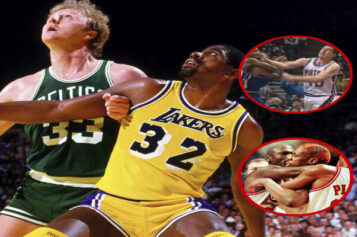As former NBA Commissioner David Stern, who passed away on Wednesday at age 77, continues to be lauded for his orchestration of the NBA’s massive growth and financial expansion over the past 25 years, we can’t forget that his legacy is also filled with social activism.
As NBA commissioner, Stern stepped up for the disenfranchised, minorities and women on several game-changing occassions.
He was willing to fund and launch the WNBA, effectively valuing equity and opportunity in athletics for every gender over rigid, capitalistic profitability. The NBA’s support of the WNBA allowed the league to grow, develop a fanbase and it now functions as the No.1 women’s pro sports league in the world, cultivating dreams and inspiring thousands of young lady ballers to reach for the stars.
WNBA Commissioner Cathy Engelbert released the following statement:
We are deeply saddened by the passing of NBA Commissioner Emeritus David Stern. The
WNBA will be forever grateful for his exemplary leadership and vision that led to the founding of
our league. His steadfast commitment to women’s sports was ahead of its time and has
provided countless opportunities for women and young girls who aspire to play basketball. He
will be missed.”
David Stern Backs Magic, Educates World On HIV
Stern’s most humane, poignant act as commissioner came when he supported Los Angeles Lakers great Magic Johnson and allowed him to return to the league after the NBA legend announced in 1991 that he had shockingly contracted HIV.
David Stern was such a history maker. When I announced in 1991 I had HIV, people thought they could get the virus from shaking my hand. When David allowed me to play in the 1992 All Star Game in Orlando and then play for the Olympic Dream Team, we were able to change the world.
— Earvin Magic Johnson (@MagicJohnson) January 1, 2020
Stern’s willingness to take a chance on a potential PR nightmare in order to erase some of the negative stigma surrounding HIV — while using one of basketball’s legendary stars as living proof that the disease was not a “death sentence” — is one of the most socially transformative and influential stances in the history of sports.
Flashback to Nov. 7, 1991:
In 1991, HIV/AIDS was still largely seen as a disease that affected gay men and drug addicts — despite its growing encroachment in the African American community.
Almost 40 years later, the impact of Johnson’s announcement was huge, explains Dr. Marsha Martin, who was once the special assistant on HIV/AIDS policy to Health and Human Services Secretary Donna Shalala.
The public at large learned something and the black folks learned something. … You can live with this, and you also don’t have to discuss the how, when and why. That’s not what’s important. What’s important is you can be tested, you can get treated. And if you do your best, try to be as healthy as you can, take your medicines, do your exercise, eat properly, have the support of your family, you can make it.
When Johnson was allowed back into the NBA, the move was impactful, lauded and highly criticized as the world was just learning about the deadly disease and there were still a lot of false narratives circulating involving how its transmitted and its cause.
At the time, very few celebrities had gone public with an HIV diagnosis and the ones who were suspected of having it didn’t have a fan following like Magic, who admitted to contracting the disease from unprotected heterosexual sex.
The world quickly discovered that supremely conditioned heterosexual males were susceptible to the illness as well. Magic did his part to spread AIDS awareness by putting it honestly and openly on a global platform and enlightening people about the medical facts of the illness.
His presence did a lot to dismiss the biases and mistruths about people who contracted HIV. It also inspired more safe sex campaigns and a galvanized effort by government, law enforcement, the educational community, celebrities and community activists to spread the mesage of sexual awareness and responsibility.
David Stern was Johnson’s partner in this heroic endeavor. He risked serious backlash from the league, fans and players when he allowed Johnson to play ball despite having the HIV virus. Allowing Magic to represent the country in the Olympics with the ’92 Dream Team was another loud, impactful stance by Stern, which again softened initial concerns and attitudes towards people with HIV.
Stern was educated on the disease, which is why he had no problems with putting Magic back on the floor in the first place, regardless of which ignoramuses said they didn’t want to play with Magic.
He understood that the disease couldn’t be transmitted through physical contact or perspiration.
NBA Style Social Activism
Magic and Stern refused to allow the growing number of HIV positive people in the world to crawl into a life of obscurity and depression as lepers. They helped the world recognize the inflicted as victims of an illness and not cancers on society. Magic has continued his social activism and philanthropy.
The explosion of the NBA during Stern’s reign as Commissioner from 1984-2014 is definitely the part of his legacy that he gets the most credit for. Stern’s refusal to discriminate against Magic, however, showed the league as empathetic, informed and brave enough to set its own social standards.
It created a new connection between the NBA and its growing fanbase. Beyond all of the glitter and glam and million dollar deals, the league stood for something. It wasn’t purely elitist.
Stern had a way with people issues. He understood the power of the league and the impact it could have on the world. He proved it when he put Magic Johnson and the HIV epidemic and then the WNBA on the NBA’s back. That exemplifies his legacy as much as anything else.



